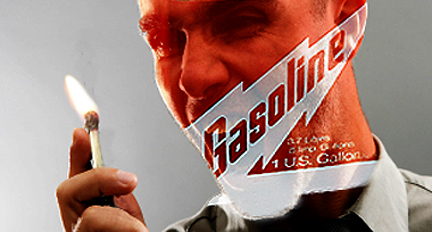 Gasoline is a volatile substance. Every time you fill your car up, take a
look at the posted warnings that tell you not to smoke when you are using the
pumps. Even the fumes from gasoline can ignite and cause a massive explosion. I
suppose you know people who are gasoline: any little spark can set them off.
They go from calm to boom in the blink of an eye. Everyone avoids them.
Gasoline is a volatile substance. Every time you fill your car up, take a
look at the posted warnings that tell you not to smoke when you are using the
pumps. Even the fumes from gasoline can ignite and cause a massive explosion. I
suppose you know people who are gasoline: any little spark can set them off.
They go from calm to boom in the blink of an eye. Everyone avoids them.
Now what happens when those explosive personalities are your customers?
Every business depends upon a level of customer satisfaction. Good marketing
plans take this into account and follow up with clients to make sure they are
pleased with the products and services being rendered. But how do you deal with
the person who is hot-tempered and is your customer? Should you avoid them? No,
if you are doing a good job at marketing, you have to hear the good and bad
about your products and services. Customer feedback is essential to making the
right moves. Should you cower at their feet and take whatever they dish out? I
think that leads to a bunch of bad results, like devaluing your brand, allowing
a person to run roughshod over you and your coworkers, and never getting to the
heart of the issue. Because when someone has such a short fuse, rarely do you
get at what is really wrong. Here are some keys to dealing with the Molotov
cocktail personality.
What would solve this
problem for you?
One key question to diffuse the explosive personality is to confront them
with questions. Don’t do this in a confrontational way, but look for ways to
make things right in the eyes of the customer. If you ask, "Obviously you are
pretty upset. What would solve this problem for you?” that puts the ball back
in their court to suggest a fix that they could live with. If they are
unreasonable, let’s say they want more than you can give, a follow up response
might be, "I hear what you are suggesting, but if we do that, we will not be
able to sustain our business, so let’s look for another solution.” This gives
you a position from which to negotiate. Maybe you can meet him halfway. Maybe
you can suggest another route to make things right. Whatever your course of
action, try to sift through the anger and get to the heart of the problem. Asking
for a fix should do this for you.
Don’t light matches around
gasoline fumes
Gasoline is so explosive, even its mere vapor will blow up if it meets a
simple spark. Understand the customer well enough that you know what sets him
off and stay clear of it. It may be certain trigger words or actions that
ignite the fuse. Study your customer. Know what to say and what not to say.
Don’t let a tough exterior
push you away
If you are good at reading people, find the passion of their life and work
your way in. Most people have a soft spot under their armor. Find out what that
is with your customer. I once had a customer who was very volatile. People
cowered around him. I was warned that one step out of line and he would fly off
the handle and fire you. He did it to his employees, he did it to his vendors,
he even did it to his customers. Everybody ducked when he got angry. I found
out he loved to fly. He had a very stressful job and he flew after work,
particularly in the summer in a biplane he owned. It took the edge off his day.
I started talking to him about it. I was always fascinated with open cockpit
biplanes. He had restored an old plane and spent his evenings flying around.
One day he asked me where I lived. That evening, I heard a very distinct roar
in the sky. I went out my front door to see him buzz just over my rooftop! I
knew I had found his soft spot, his passion, the thing he loved to do. I called
him the next day to tell him I needed a reference for a roofing contractor due
to his flying ability. We laughed! It was something I could talk about with him
and humanize the conversation. When you can do this, it gives you leverage to
talk to your customer as a peer rather than from a subordinate position.
Be the expert of what you
produce
Whether you sell a product or a service, understand it well. Make sure you
have thought through common problems and how you would fix them. When you are
dealing with someone who has just blown up, many times it is simply because
they don’t know what to do. They feel backed into a corner. Be the expert with
a plan to fix their problems. Real solutions take the fire out of the equation.
Make a point of looking ahead at problems coming down the pike. Show them the
problem, but always have the solution ready. In this way you will diffuse the
situation before it arises.